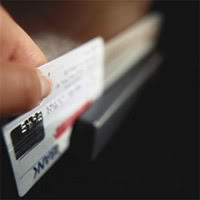Creating Smart Goals When It Comes To Finances

Creating smart goals when it comes to finances starts by paying yourself first. Paying yourself first is paying yourself before you pay the bills, your rent, your mortgage and BEFORE you use that money on entertainment. The best way to ensure this happens is to take money directly out of your bank account and put it in a separate one for saving.
If you want to begin saving but are you having trouble finding extra money at the end of the month, pay yourself first is a smart goal that is the easiest way to start saving without a lot of discipline required.
When I wanted to move out and purchase my first place I started brainstorming ideas for creating smart goals on how to save enough money for a substantial down payement. I was able to come up with a large down payment because I paid myself first.
At the beginning I had $200 removed from each paycheque and put into a separate account that was more difficult to access. If I made $1000 a paycheque and set up an automatic withdrawal of $200, I would essentially only have $800 left to spend. Over time as I adjusted my spending habits and got accustom to “earning” less and eventually I would challenge myself to save more by increasing the automatic withdrawal.
Another financial goal setting tip is to increase the withdrawal amount is when you get a raise. For example, if I got a raise of $50 extra a paycheque I would immediately increase my withdrawal from $200 to $250 before I was able increase my spending habits.
 Right before I moved out I was up to an automatic withdrawal amount of $450 a paycheque. However, please do not get discouraged if you cannot put that much away or think that only people with higher paying jobs can do this. Keep in mind that I was lucky enough to live at home, thus incurring only minimal expenses.
Right before I moved out I was up to an automatic withdrawal amount of $450 a paycheque. However, please do not get discouraged if you cannot put that much away or think that only people with higher paying jobs can do this. Keep in mind that I was lucky enough to live at home, thus incurring only minimal expenses.
Saving something is better than saving nothing! You will be surprised how quick it will add up.
The key to creating smart goals when it comes to your finances is to have your money transferred into an account that is difficult to access. If your savings account is linked to your chequing account you will find that you might be tempted to dip into it for “emergencies” and not end up saving anything. Also it is important to place it in a high interest saving account to earn interest fast. Your risk level will depend on how quick you will need the money. In Canada, a tax-free saving account is a good option. So is setting up an account with your financial advisor.
Although it is important to challenge yourself, you are setting yourself up for financial goal setting failure if you become too ambitious at the beginning by setting up auto-withdrawal that is too large that causes you to struggle to pay bills. Being slapped with late fees on your accounts is counter productive. You should, however, expect an adjustment period with your spending habits at the beginning but that only should be temporary. Do not get frustrated, think of all the extra money you have at the end for a down payment or a vacation.
How do you determine how much to pay yourself with?
You need to create a budget for yourself to find out where all your money goes. If after all your essential bills are paid you end up with a large disposable income the automatic withdrawal amount should come easy to you. Remember what I said: start off small so there’s a minimal adjustment.
What if you already live paycheque to paycheque how do I begin creating smart goals for my finances?
Again create a budget for yourself. Most people do not notice $20 a paycheque missing. It’s often just wasted away on non-essential items. Look for other ways to reduce your current spending. Switch to a cheaper grocery store, decrease your cable TV package ( or get rid of it all together ) or cut down the amount of nights you go out.
Finally, the key to creating smart goals is to start small and remember it may only be $20 a paycheque but if you are paid bi-weekly that’s $520 extra a year (that's 26 paycheques x $20 each).
Click here for more creating smart goals for financial success.
Back to SMART GOALS FOR SUCCESS homepage.



